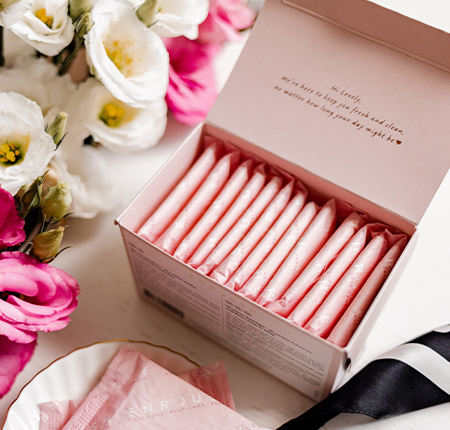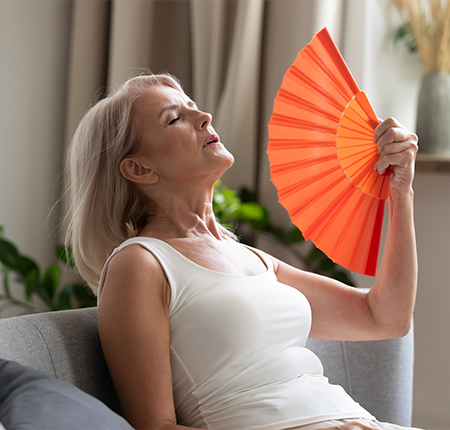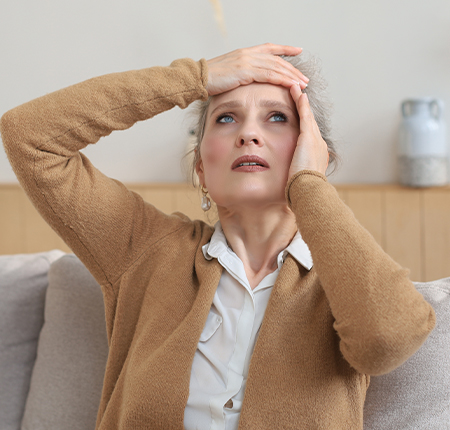
Hot flashes can be triggered by several factors. But for women, the most common cause is menopause. Most of the time, it's not a cause for concern, and it doesn't mean that hot flashes are hiding illnesses or other serious health problems. It's just that you're experiencing a symptom specific to menopause, a stage that is normal in every woman's life and that you don't need to fear or avoid.
However, it doesn't mean you have to sit and suffer, especially if you feel that hot flashes are affecting your sleep, daily activity, mood and ultimately your quality of life. There are many ways you can manage these hot flashes, from natural remedies to doctor-prescribed treatments to relieve your symptoms. Read about all these things in our article.
What are hot flashes?
Hot flashes are a sudden feeling of intense heat. They appear most often in the upper part of the body and are more intense on the face, neck and chest, accompanied or not by reddening of the skin and sweating. They are popularly known as "heat waves" and most often have no clear justification (such as, for example, after a running session or after an intense workout), but simply appear and disappear without a apparent reason.
These hot flashes can also occur during the night, and in this case they are known as "night sweats". They can disturb your sleep, which is why they can lead to insomnia and depression if they are repeated frequently, requiring a visit to the doctor to find a solution and manage them more easily.
Although men can also have hot flashes, women are more prone to these intense sensations of heat that appear especially during menopause. There are a lot of changes going on in your body during premenopause and menopause , and hot flashes are one of them. You don't need to panic, because it is a common symptom that, according to studies, 3 out of 4 women have during menopause.
At what age do hot flashes appear?
As for menopause-specific hot flashes, they can appear any time in premenopause, so any time after the age of 40 (and, rarely, even earlier, when we talk about an early menopause). In this case, hot flashes can be observed along with the irregularity of the menstrual cycle and the thinning of periods, when the hormonal level begins to change in the body.
During this period, the balance of hormones is already affected, being an additional reason for you to protect your intimate flora and prevent any inflammation or infection that can disturb you at the hormonal level. So we recommend that you use only 100% organic cotton products and pure ingredients for intimate care. Enroush products are hypoallergenic, with neutral pH and natural ingredients to give you gentle care without negative effects.

If, on the other hand, hot flashes occur for another reason, such as a hormonal condition or other health problem, then they can start at any age and require a medical consultation as soon as possible to detect and treat the causative factors.
How long do hot flashes last?
An episode of hot flashes can last a few seconds, or it can last up to 30 minutes. As for how long you can experience hot flashes during menopause, they can continue for 6 months or even 5 to 10 years after menopause. Every woman will have her own experience with these hot flashes, as with all other menopausal symptoms.
Why do hot flashes occur - Causes
There are two categories of causes for hot flashes, namely natural hot flashes that are normal and occur during menopause, and hot flashes that occur due to another condition and require treatment. Let's talk one by one about the causative factors in both situations.
For the hot flashes that appear at the end of the menstrual cycle, the causes are not precisely determined. But the hormonal changes that occur with the onset of menopause play an obvious role in their appearance. The level of estrogen and progesterone drops significantly in the body, which can cause body temperature irregularities and implicitly those sudden heat waves and excessive sweating.
Another possible cause of hot flashes can be pregnancy . A mother-to-be experiences a series of equally significant disturbances in the level of estrogen and progesterone in the body, so it is normal to experience sweating and hot flashes during pregnancy.
As for other conditions that can cause hot flashes, the most common causes of unexplained hot flashes include:
- Metabolic syndrome
- Obesity
- hyperthyroidism
- HYPOGLYCAEMIA
- Food allergies and intolerances
- The stress
- Tumors in the adrenal glands
- Treatment for breast cancer
- Mastocytosis
- Hysterectomy
- rosacea
Hot flash triggers
Although you can't control when hot flashes occur, and most of the time they start suddenly, there are certain factors that can trigger or intensify menopausal hot flashes that you should avoid. Among them we find:
Consumption of alcohol, caffeine and spicy foods
Tight and thick clothing
High ambient temperature
Stress and anxiety
Smoking (including passive smoking, i.e. exposure to cigarette smoke when another person smokes).
How a hot flush manifests itself
You know how we always tell you that menstruation and the menstrual cycle are unique experiences for every woman? Well, it's the same with menopause, the symptoms of which vary greatly from person to person.

Hot flashes start and manifest differently, with different duration and intensity for each woman. Some hot flashes go almost unnoticed, while others can affect daily life. They can set in gradually, or appear out of the blue. They can pass in seconds, or they can persist for up to 30 minutes. Hot flashes can also be recurrent, and come back like this several times in an hour.
The main symptom of menopause hot flashes is the strong sensation of body heat, in the upper part, especially in the face, neck and chest. These waves can be accompanied by:
- Flushing of the face, neck and chest
- The sensation of hot skin
- Numbness or tingling in the fingers
- Increased heart rate (tachycardia)
- Profuse perspiration
- Anxiety states
- Intense chills
Chills are normal especially if hot flashes are accompanied by heavy sweating. After the feeling of heat disappears, it is normal for a sweaty body to feel a strong sensation of cold.
Also, if hot flashes have causes other than menopause, they can be accompanied by symptoms such as palpitations, restlessness, high blood pressure and intestinal transit disorders.
What can you do during a buffet?
You don't need to do anything during the heat wave, especially if it only lasts a few seconds. If, on the other hand, the feeling of heat persists and affects your activity or sleep, there are some easy ways to manage these moments more easily. Here are some things anyone can do:
Drink cold liquids: Water or iced juice drunk as soon as you feel a hot flush starting can reduce the intensity of your symptoms.
Wear layers: This way you can quickly adjust your clothing depending on how hot or cold you are.
Choose cotton clothes and underwear: Especially if you experience night sweats, cotton clothes and bedding will increase your comfort by letting your skin breathe, and won't make the sweats worse.
Avoid tight clothes made of synthetic fibers: they do not allow the skin to breathe and otherwise cause sweating.
Keep track of your symptoms: a good idea is to have a notebook handy, like a hot flash diary of sorts (it doesn't have to be a physical diary, it can even be an app on your phone). You can keep track of when the hot flush started and how it progressed, so you can see over time if there are any recurring elements that can point you to triggers you could avoid.
Treatment for hot flashes
There are a lot of solutions you can use to make hot flashes easier to manage so they don't have a negative impact on your life.
If a health problem is the cause, then of course the appropriate treatment will be given first and the hot flashes will improve at the same time.
And if hot flashes are caused by menopause and affect your sleep or daily activity, in the lines below we tell you what the solutions are. What is important to remember is that all these treatments should be taken after a visit to the office and a discussion with the doctor, so that you can be sure that they will work and that there will be no side effects if you follow other treatments.
Food supplements for treating hot flashes
Among the most commonly used supplements to get rid of or relieve hot flashes are natural, herbal supplements and vitamins:
Vitamin E : can relieve feelings of heat
Black Cohosh : An herb often used to relieve menopausal symptoms
Ginseng : May relieve insomnia and improve mood
Foods rich in plant estrogens : such as soybeans, flaxseeds and dried fruits
Keep in mind that any supplement, even those that seem harmless (such as vitamins and minerals, or natural herbal supplements), can have a reaction with other treatments you're taking. Also, they are subjective treatments that may work effectively for one woman, and may be completely ineffective for another woman.

So always talk to your doctor before supplementing your diet with a treatment like this to make sure it really will help your hot flashes and that it's safe to take. Ask your doctor for advice including the dosage, concentration and period of administration of these supplements.
Hormone replacement therapy to treat hot flashes
Estrogen-based hormone treatments are used especially for women whose hot flashes affect their sleep or daily life. They can be effective in reducing the frequency of hot flashes, but are given with progestin to prevent endometrial cancer in women who still have a uterus.
Those who have already had a hysterectomy no longer need this protective measure, so they can be given only estrogen, no progestin.
Non-hormonal treatment for treating hot flashes
Selective serotonin reuptake inhibitors (SSRIs) are antidepressant medications that are a form of nonhormonal treatment that your doctor may decide to recommend to decrease the frequency and severity of hot flashes by regulating serotonin levels. Can be used:
- Paroxetine , approved by the FDA (Food and Drug Administration) for the treatment of hot flashes.
- Venlafaxine , whose effectiveness for hot flashes has been proven by studies.
- Desvenlafaxine , a newer (and less studied) form of venlafaxine.
- Fluoxetine , which can relieve hot flashes.
- Escitalopram , to treat insomnia that accompanies hot flashes.
- Gabapentin , also for treating insomnia caused by night sweats.
Although they may have beneficial effects, the original purpose of these antidepressants is not to treat hot flashes. So it is very important to follow the specialist's instructions regarding dosage and administration periods.
Alternative therapies for treating hot flashes
There are also natural remedies that many women try to treat hot flashes that do not require a prescription. These include herbal essential oils, various teas for menopause hot flashes, meditation, hypnosis or acupuncture. They can prove effective because they reduce stress and anxiety levels, but the placebo effect can play an equally important role.
Studies have not been able to demonstrate significant improvements in people who have undergone such therapies, compared to those who have participated in placebo procedures.
Lifestyle changes help reduce hot flashes
It is no longer news that hormonal balance is greatly influenced by lifestyle. Daily stress, insufficient or excessive nutrition, as well as bad habits, can aggravate hot flashes. Eliminating these factors along with implementing positive changes and healthy lifestyle habits can help restore hormonal balance and relieve hot flashes. Thus, you can make small changes such as:
Avoid smoking (including secondhand smoke) and excessive alcohol and caffeine consumption.
Eat nutritious foods in a balanced diet.
Avoid spicy foods and those that you notice trigger your hot flashes.
You have an active lifestyle, exercising several times a week.
You control your weight, i.e. reduce your body mass in case of overweight.
You also learn to practice stress management techniques.
How to prevent hot flashes
Since the causes of hot flashes cannot be determined exactly, there are no preventive measures with maximum efficiency. Sometimes, you just can't prevent menopausal hot flashes.
Instead, what you can do is track your triggers, maybe even with a journal, and avoid situations that you notice trigger your hot flashes. A balanced lifestyle can also improve these conditions.
If you can get into the habit of dressing in layers, this can help you manage these episodes more easily. Cotton bedding and clothes can do the same, to prevent night sweats or at least to reduce discomfort.
Frequently asked questions about hot flashes
In this section we'll also answer some of the most common questions about hot flashes, because we know you're curious about whether they go away after menopause and if there's some wonderful solution we haven't talked about yet. Find out the answers below.
Do hot flashes go away after menopause?
Hot flashes may or may not go away after menopause. Sometimes, they disappear after 6 months from the onset of menopause. Other times, they can even go on for 10 years. It all differs from woman to woman, depending on lifestyle and a host of other factors. The good news is that usually when hot flashes continue for long periods of time, they get better on their own and decrease in intensity.
Are herbal products safe for treating hot flashes?
Any treatment, even herbal ones, can have side effects, especially if you are taking other treatments as well. Even though they are usually safe in small amounts, it's a good idea to talk to your doctor before starting any treatment.
They may also work for one person but have no effect on another. There are not yet enough studies to prove their effectiveness and benefits, but there is research that exemplifies the potential negative effects of taking large amounts of black cohosh or evening primrose oil, including indigestion, headaches, and nausea.
Are there any foods that can help me treat hot flashes?
Changes in estrogen levels in the body can influence the severity of hot flashes. So you can try eating more foods rich in plant oestrogens, as they can have (on a smaller scale, of course) similar effects to the body's own oestrogen, and thus relieve hot flashes.
Some foods rich in isoflavones (these plant estrogens) are soybeans and chickpeas, lentils, flaxseeds, dried fruits, beans, vegetables, and grains.
Can I prevent nighttime (nocturnal) hot flashes?
It is difficult to prevent a phenomenon whose cause cannot be precisely determined, such as an episode of night sweats. Instead, you can take some steps to reduce the intensity of the discomfort and relieve the symptoms of a hot flush.
For starters, choose cotton clothes and bedding that let your skin breathe. Also, make sure you have a glass of cold water handy, and avoid spicy foods (or other foods that trigger your heartburn) before bed. A healthy lifestyle can also help relieve both nighttime and daytime hot flashes.






















